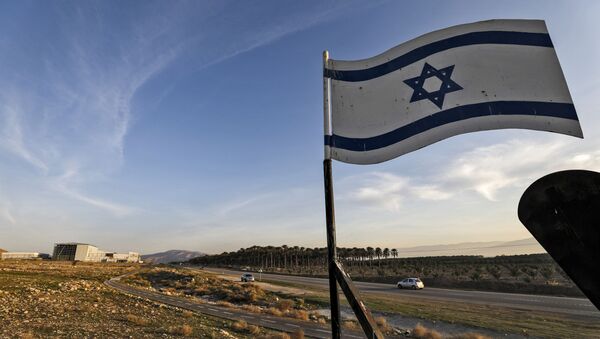The Palestinian Authority (PA) has opted to pay the salaries of prisoners jailed in Israel for terror-related offences, prioritising them over teachers and social welfare recipients, according to Palestinian Media Watch.
This is amid reports that the revenues of the PA are expected to shrink due to the raging Coronavirus, with Ramallah set to receive less money from international sponsors.
But for Mohammed Massad, a former Palestinian terrorist turned peace activist, Ramallah's conduct is not that surprising.
"The Palestinian officials don't really care about their people. For them terror is business that brings in dividends. They are corrupt and indecent, and that causes many people to get disappointed in them."
Breeding Hatred from Early Age
Massad was one of them. Born in Jenin, one of the major cities of the West Bank that during the Second Popular Uprising (Intifada) in the early 2000s produced multiple suicide bombers who killed and injured dozens of Israelis, Massad knew firsthand what resistance to "Israeli occupation" meant.
As a child he was growing up listening to the songs that called on the Palestinians to liberate their land from the "Zionist oppressors," and as a teen he decided to enrol in one of Fatah's most notorious armed groups, the Black Panthers, that was responsible for multiple terror activities against Israelis.
"I hated the Israelis so much that even talking to one of them was considered a betrayal for me. All I wanted was to liberate my land and let my people live in prosperity and dignity," he recalls.
To achieve that goal, he was ready to terrorise Israelis. In the early 90s, he (along with other members of the cell) tried to kidnap an Israel soldier and has even met with Yahiya Ayyash, the chief bomb-maker of the rival group Hamas, who offered the use of his explosive belts and car bombs "to combat the occupation".
"We refused as we were not prepared to die for the struggle. We wanted to liberate Palestine but not at the cost of our own lives," he explained.
The meeting, however, was more than enough for the Israeli security forces to arrest the entire cell and send them to prison. For Massad, that experience was an eye opener.
"A prison is a real terror academy. It is there that you get acquainted with other terrorists, it is there that they teach you how to improve your terror skills and it is there where you get radicalised."
New Life, New Disappointments
However, that didn't happen to Massad. Once released in 1993, after serving less than two years in prison, he decided to take a different path and started working for the Palestinian Authority that had just been established.
Soon enough, however, he realised that that too was a mistake. "We appreciated the Palestinian leadership when it was in exile but when they came here in 1993, straight after the Oslo Accords, we realised the magnitude of our mistake. Their corruption shocked many," said Massad.
According to reports, the PA has been marred with corruption since the early days of its establishment. Between 1995 to 2000, for example, Yasser Arafat, the late leader of the Palestinian Authority, diverted $900 million of the authority's tax and business income to his personal bank accounts. Similarly, between 1997 till 2000, the Palestinian leadership transferred $238 million to Switzerland without notifying its donors.
The situation hasn't improved over time. A survey conducted in February by the Palestinian Centre for Policy and Survey Research (PCPSR) found that 85 percent of Paleatinians believed their leadership was corrupt.
Embracing the Enemy
Massad says he couldn't put up with the PA's unlawful conduct and that prompted him to speak up, but that only got him deep into trouble. Arrested and tortured for several days, his interrogators hoped to bang out his confession that he was in fact an Israeli spy, or at least, a collaborator, a statement -- that if given -- would have been tantamount to a death sentence.
After they failed and Massad was released, he promised himself that he would flee the PA for Europe or the US. But life had a different plan.
In early 2000s he started working in Israel in construction. Surrounded by Israelis, he realised "they weren't as bad as the PA depicted them to be" but the turning point occurred in 2002. While waiting for workers -- whom he used to smuggle to Israel for work, he noticed a Palestinian terrorist who pounced on an Israeli soldier patrolling the fence that separates Israel from the West Bank in an attempt to grab his rifle.
"My instincts were very sharp, I ran towards the terrorist, beat him up and managed to get the rifle back," he recalls, adding that that deed paved the way for him to obtaining Israeli citizenship.
"The Israeli authorities had realised that I don't cause problems and that I only want peace. But I am not alone. There are hundreds of thousand like me, who want to lead a peaceful life along with Israelis," he said, referring to the 150,000 Palestinians who work in Israel in agriculture and construction and who rely on Israel for an income.
Yet, surveys conducted by the PCPSR show less optimism. In 2018, for example, the support for a two-state solution among Palestinians stood at 43 percent, a drop from the previous 52 percent in 2017. Additionally, 17 percent believed that the solution to the conflict would only be possible with "the expulsion of Jews" whereas 8 percent would allow Jews to stay in the independent Palestinian state but without any rights.
Massad acknowledges the problem. "Our generation had failed to bring peace and stability but it is not a lost battle. We can still make this area better if we only educate our children not to repeat our mistakes and not to differentiate between Jews, Muslims and Christians. After all: we are all human beings."



